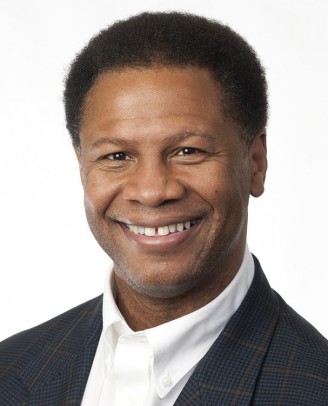$17 million federal grant to tackle cancer in Chicago’s low-income, minority neighborhoods
According to the Illinois Department of Public Health, Chicago communities that are low-income or predominantly African-American or Latino have cancer death rates up to twice the national average. A new, $17.4 million grant from the National Cancer Institute will enable three Chicago universities to work together with the city’s underserved communities on cancer research, education, training and outreach.
The five-year grant will fund the Chicago Cancer Health Equity Collaborative, to be led by researchers from the University of Illinois at Chicago, Northwestern University’s Robert H. Lurie Comprehensive Cancer Center and Northeastern Illinois University. The collaborative, the first of its kind in the Midwest, includes researchers and educators from diverse backgrounds and a range of academic disciplines.

Dr. Robert Winn, associate vice president, community based practice, University of Illinois Hospital & Health Sciences System.
An Oct. 23 community kick-off event at the Arturo Velasquez Institute in the Little Village neighborhood launched the initiative, aimed at reducing the burden of cancer in Chicago’s low-income and ethnic minority communities.
“We have a strong commitment to serve our community and the needs of our students,” said UIC Chancellor Michael D. Amiridis. “This partnership expands on opportunities to educate and train a pipeline of minority and underrepresented students who are interested in pursuing health-related careers and develops a diverse workforce to meet the nation’s biomedical, behavioral and clinical research needs.”
“We are making exciting progress in the war against cancer. New approaches are emerging in cancer treatment, screening and risk reduction, but not everyone is benefitting equally from these advances,” said Dr. Leonidas Platanias, director of Northwestern’s Lurie Cancer Center. “This award will support our efforts as an NCI-designated Comprehensive Cancer Center to community outreach and to reducing cancer health disparities in the communities that need it most.”
“We are so pleased to be able to continue our partnership with the Lurie Cancer Center and to add UIC to the very important partnership that began five years ago,” said Maureen Gillette, dean of the Northeastern Illinois University College of Education. “The focus on cancer health disparities in underserved communities fits well within the mission of Northeastern. The work that we’ve done together with Dr. Simon’s team for the past five years has resulted in foundational research and scholarship by faculty and students from both universities. This grant provides a unique opportunity to build on this work toward a more comprehensive approach to addressing the critical need for cancer equity.”
The collaborative will be led by community-focused physician-scientists and researchers, including Dr. Robert Winn, associate vice president for community-based practice at the University of Illinois Hospital & Health Sciences System, professor of medicine in the UIC College of Medicine and director of the University of Illinois Cancer Center; Dr. Melissa Simon, the George H. Gardner, MD Professor of Clinical Gynecology in Northwestern University’s Feinberg School of Medicine; and Christina Ciecierski, associate professor of economics, and Moira Stuart, associate professor of health, physical education, recreation and athletics, of Northeastern Illinois University.
UIC and Northeastern have good track-records of enrolling and graduating students from minority and nontraditional backgrounds and have longstanding partnerships with Chicago communities.
“UIC plays a unique role in this partnership,” said Winn. “We have seven health science colleges that will contribute to achieving the objectives of the grant, as well as a network of federally qualified community clinics, our Mile Square Health Centers, that put us in direct contact with patient populations on the south and west sides of Chicago, which are disproportionately burdened by cancer. Additionally, the University of Illinois Cancer Center is integrated into our Mile Square Health Centers, so we are well-positioned to make a significant impact on reducing cancer disparities.”
Northwestern’s Simon said that despite the existence of five academic medical centers in Chicago and millions of dollars spent on cancer research and treatment of the city’s residents, “we are still only in our infancy in responding to cancer health disparities.” The collaborative, five years in the making, Simon said, now offers “a way to move forward and foster the wonderful work of communities and organizations already working towards improving cancer equity.”
“The goal of our partnership is to connect with all Chicago communities,” said Northeastern Illinois’s Ciecierski, a native Chicagoan and first-generation American. “We will use the tools of education, research and advocacy to improve health among Chicagoans, especially those chronically underserved. As an educator, I know that training and community outreach will spread good health to all Chicago neighborhoods.”
Research will aim to improve cancer prevention, early detection, treatment, and survivorship.
“The efforts of this collaborative will enable us to develop programs that aim directly at the cause of disparities and empower those who are most severely impacted by cancer inequities,” said Northeastern’s Stuart.
Activities of the Chicago Cancer Health Equity Collaborative will include:
- establishing biomedical, socio-behavioral, basic and translational science research programs in cancer disparities
- mobilizing researchers, educators, community leaders, students, organizations and patients in innovative cancer education and outreach programs
- providing training and mentoring to recruit and retain minority and underrepresented students in health and cancer research careers
- supporting career development and advancement of minority and underrepresented faculty.
